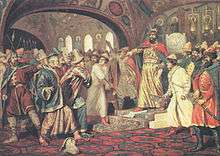Ahmed Khan bin Küchük
| Ahmed Khan | |
|---|---|
| Khan | |
| Reign | 1465–1481 |
| Predecessor | Mahmud bin Küchük |
| Successor | Shayk Ahmad |
| Born | Golden Horde |
| Died |
January 1481[1] Sarai |
| Dynasty | Golden Horde |
| Father | Koirichak |
| Religion | Islam |

Ahmed bin Küchük (Urdu; Persian; Arabic:احمد خان بن کوچک) was a Khan of the Great Horde between 1465 and 1481. In 1465, Ahmed Khan seized power in the Horde by rising against his brother Mahmud bin Küchük, who had been its ruler since 1459. In 1472, Ahmed Khan entered into alliance with the Polish king Casimir IV against Ivan III. In 1476, Ahmed Khan suggested to Ivan III that he should recognize him as his overlord. However the situation of forces was not in the Horde's favour. In 1480, Ahmed Khan organized another military campaign against Muscovy, which would result in the Horde's retreat (Great standing on the Ugra river) 150 miles from Moscow. They stood off shouting at one another on opposite banks for weeks before a conflict became inevitable. Panic set in, as both sides suddenly turned deciding to flee, rather than fight in the tradition of Genghis Khan. At the last the conflict between Eurasians was over. The Mongols last possessions were in Kazan, Astrakhan, and the Crimea. Ivan III, Russia's ruler finally freed himself from the Tatar-Mongol dependency.
On 6 January 1481, Ahmed Khan and his men were killed by Siberian Khan, Ibak Khan of Tyumen and Nogays at the mouth of the Donets River.
| Ahmed Khan bin Küchük House of Borjigin (Боржигин) (1206–1635) | ||
| Regnal titles | ||
|---|---|---|
| Preceded by Mahmud bin Küchük |
Khan of the Great Horde 1465–1481 |
Succeeded by Shayk Ahmad |
References
- ↑ Kołodziejczyk 2011, p. 24.
Bibliography
- Kołodziejczyk, Dariusz (2011). The Crimean Khanate and Poland-Lithuania: International Diplomacy on the European Periphery (15th-18th Century): A Study of Peace Treaties Followed by Annotated Documents. Leiden: Brill. ISBN 9789004191907.